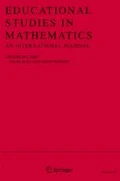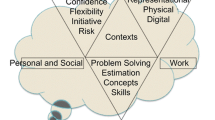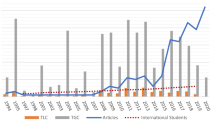Abstract
Problems teaching probability in Tonga (in the South Pacific) led to the question on how language and culture affect the understanding of probability and uncertainty. The research uses a discursive approach to identify the endorsed narratives which underlie Tongans’ reasoning in situations of uncertainty. I aim to justify the claim that the Tongan language and the Tongan way of life interact to make the concept of uncertainty very different from that found in western countries and the concept of probability almost redundant in Tongan day-to-day discourse. There are very few cross-cultural studies concerning the ways in which probability and uncertainty are understood in different cultural contexts, and this article aims to make a small contribution to filling this gap.

Similar content being viewed by others
Notes
I was shown a copy of this in the Curriculum Development Unit of the Ministry of Education but was unfortunately unable to make a copy or record a reference
Probability theory originated with a correspondence between Pascal and Fermat. They aimed to answer a question relating to the probability of winning a card game.
The idea that angels act as intermediaries has a long history. An interesting example comes from Kepler’s description of his coming across the idea that constituted the seed of his discoveries about planetary motion. He wrote: “It would be mistaken to regard it as a pure invention of my mind ….. For as if a heavenly oracle had dictated it to me”.
References
Amir, G. S., & Williams, J. S. (1999). Cultural influences on children’s probabilistic thinking. Journal of Mathematical Behaviour, 18(1), 85–107.
Barton, B., & Frank, R. M. (2001). Mathematical ideas and indigenous languages. In B. Atweh, H. Forgaz, & B. Nebres (Eds.), Sociocultural research in mathematics education: An international perspective (pp. 135–140). Mahwah, NJ: Lawrence Erlbaum Associates.
Campbell, I. C. (1992). Island Kingdom, Tonga ancient and modern. Cristchurch, New Zealand: Canterbury University Press.
Campbell, S.J. (1957). The development of education in Tonga. Unpublished Master’s Thesis, University of Queensland.
Chassapis, D. & Chatzivasileiou E. (2008). Socio-cultural influences on children’s conceptions of chance and probability. Proceedings of the Fifth international Mathematics Education and Society Conference, Lisbon, Portugal: The Centro de Investigação em Educação, Universidade de Lisboa and the Department of Education, Learning and Philosophy, Aalborg University.
Churchward, C. (1959). Tongan dictionary. Nukualofa, Tonga: The Government of Tonga Printing Press.
Cole, M. (1996). Cultural psychology, a once and future discipline. Cambridge, MA: The Belknap Press of Harvard University.
Deutscher, G. (2010). Does your language shape how you think? New York Times Magazine, August 10th 2010.
Griffiths, M., & Bingham, C. (2005). A study of superstitious beliefs among bingo players. Journal of Gambling Issues, 13.
Gumperz, J., & Levinson, S. (1996). Rethinking linguistic relativity. New York, NY: Cambridge University Press.
Hacking, I. (2006). The emergence of probability, a philosophical study of early ideas about probability induction and statistical inference. New York, NY: Cambridge University Press.
Jones, G. A. (2007). Research in probability responding to classroom realities. In F. K. Lester (Ed.), Second Handbook on Mathematics Teaching and Learning. Charlotte, NC: Information Age Publishing.
Lancy, D. F. (1983). Cross-cultural studies in cognition and mathematics. New York, NY: Academic Press.
Manu S.S. (2005). Mathematical understanding and Tongan bilingual students’ language switching – is there a relationship? Doctoral Thesis, the University of British Columbia.
Meaney, T., Trinick, T., & Fairhall, U. (2012). Collaborating to meet language challenges in indigenous mathematics classrooms. New York, NY: Springer.
Morris N.D. (2017). Fractions, probability and the Tongan way. Doctoral Thesis, the University of Haifa.
Morton, H. (1996). Becoming Tongan, an ethnography of childhood. Honolulu, HI: University of Hawai'i press.
Moulton J.E. (1921) Reprinted 2002. Moulton of Tonga. Australia: Buoyant Economies Pty Ltd.
Piaget, J., & Inhelder, B. (1975). The origin of the idea of chance in Children. London, UK: Routledge and Kegan Paul Ltd.
Presmeg, N. (2007). The role of culture in teaching and learning mathematics. In F. K. Lester (Ed.), Second Handbook on Mathematics Teaching and Learning. Charlotte, NC: Information Age Publishing.
Saxe, G. B. (2012). Cultural development of mathematical ideas, Papua New Guinea studies. New York, NY: Cambridge University Press.
Sfard, A. (2008). Thinking as communicating. human development, the growth of discourse, and mathematizing. New York, NY: Cambridge University Press.
Shaughnessy, J. M. (1992). Research in probability and statistics: Reflections and directions. In D. A. Grouws (Ed.), Handbook of research on mathematics teaching and learning. New York, NY: Macmillan.
SPBEA (2007). South Pacific board for educational assessment, chief marker's report, maths with stats.
Taufe'ulungaki, A. M. (1979). Curriculum development in Tonga: Then and now. Directions, 3, 25–35.
Taufe'ulungaki A.M. (2011). Keynote Address by the Minister for Education, Women Affairs and Culture, Hon. Dr. 'Ana Taufe'ulungaki, The workshop on safeguarding cultural heritage hosted by the ministry of education, women affairs and culture. Tonga: The Tonga National Cultural Center at Tofoa.
TCDU. (2009). Mathematics for life. Tonga: Curriculum Development Unit of the Ministry of Education and Training.
Thompson, R., & Thompson, O. (1992). The student’s English-Tongan and Tongan-English dictionary. Tonga: Friendly Islands Bookshop.
TSC (2009). Tonga school certificate examiners’ report & marking scheme – 2009 Mathematics.
Tu'inukuafe, E. (1992). A simplified dictionary of modern Tongan. Auckland, New Zealand: Polynesian Press.
Wesley J. (1835). The works of the Reverend John Wesley, A.M. New York, NY: B. Waugh and T. Mason, for the Methodist Episcopal Church.
Whorf, B. L. (1959). Language, thought, and reality. Cambridge, MA: MIT Press.
Author information
Authors and Affiliations
Corresponding author
Additional information
Publisher’s note
Springer Nature remains neutral with regard to jurisdictional claims in published maps and institutional affiliations.
The research described in this paper was carried out in collaboration with Anna Sfard and as part of a doctoral thesis at the University of Haifa.
Rights and permissions
About this article
Cite this article
Morris, N. Learning probability in the Kingdom of Tonga: the influence of language and culture. Educ Stud Math 107, 111–134 (2021). https://doi.org/10.1007/s10649-020-10022-z
Accepted:
Published:
Issue Date:
DOI: https://doi.org/10.1007/s10649-020-10022-z




